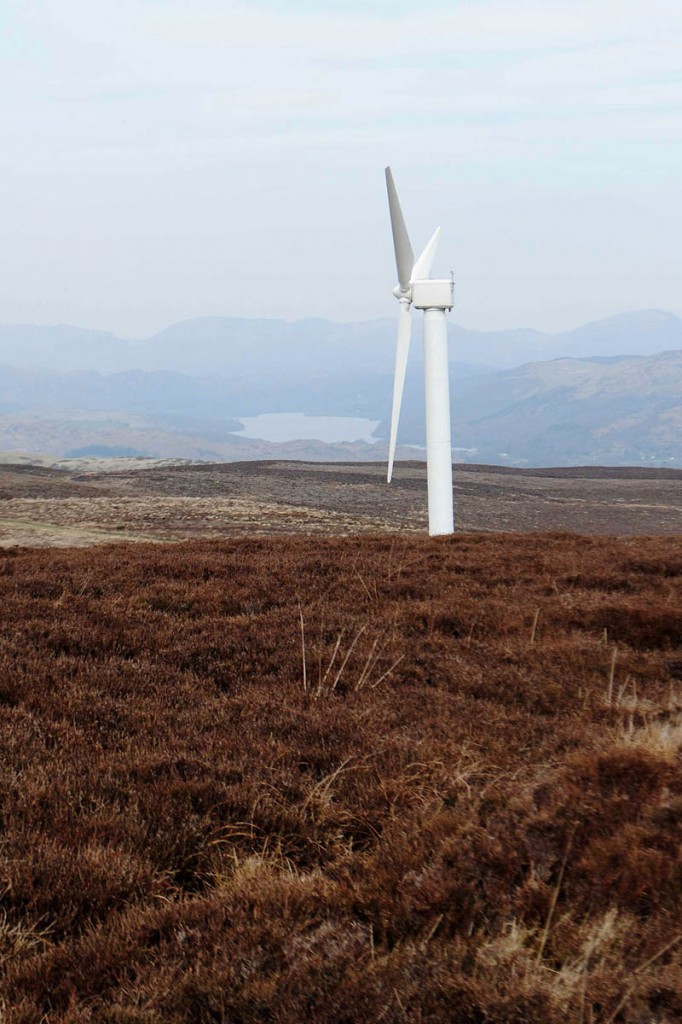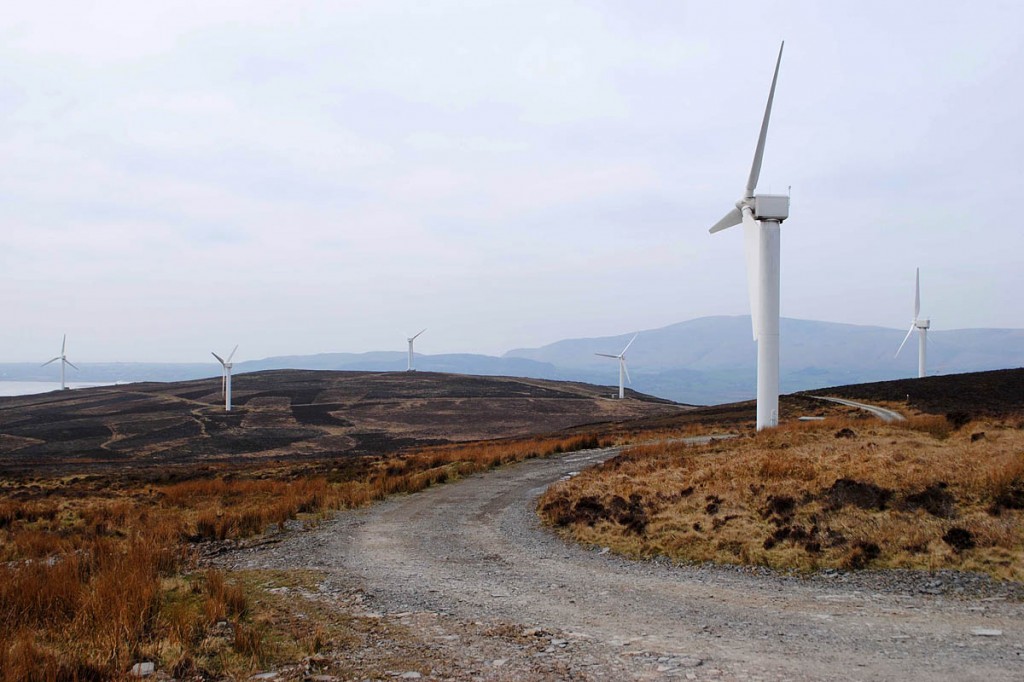Planners in Cumbria have ruled a windfarm near the boundary of the Lake District national park must be dismantled when its current consent runs out.
Zephyr Investments applied to extend the life of the Kirkby Moor operation to March 2027, but South Lakeland District Council turned down the application.
Conservation groups welcomed the decision, and pointed out the original permission was granted by the Westminster Government, which overruled a planning inspector when consent was granted in 1992. The existing windfarm is due to be dismantled under that planning consent by August next year.
The Friends of the Lake District said: “While recognising the importance of renewable energy development in providing clean energy sources, membership charity Friends of the Lake District believes that these turbines have served their purpose and are now at the end of their working life.
“Throughout their 25 years’ operation, the turbines have had a significant detrimental impact on the landscape and, in particular on the setting of the Lake District national park which is now a world heritage site.”
The turbines are situated close to the southern boundary of the national park, east of Kirkby-in-Furness.
Laura Fiske, Friends’ planning officer, said: “This decision is a victory for the local communities who live in the shadow of this development imposed on them by the Government in the early 1990s. This decision reflects the tireless effort they have put in to make their voices heard.
“In terms of both landscape and wildlife, the site at Kirkby Moor which is also a site of special scientific interest, a protected area for conservation, has never been acceptable for this type of development, and the removal of these turbines will have a net benefit to the local landscape and beyond.
“Our objections to this application were on the basis of continuing harmful impacts on the landscape and on views into and out of the Lake District; the fact that the applicant has previously stated that the turbines were at the end of their working lives, and that granting permission for a time extension would set a precedent allowing other windfarms to extend beyond their 25 year lifespans.”

The Kirkby Moor turbines are visible from the Lake District fells. Photo: Friends of the Lake District
Zephyr Investments said council planning officers had recommended approval of the application. The company, which runs 17 UK windfarms, said the local community had benefited to the tune of more than £35,000 from the Kirkby Moor Wind Farm Community Fund. It said it planned to increase these benefits if the permission was granted.
The windfarm occupies part common land on part of Kirkby Moor Common and Lowick Common.
The Open Spaces Society also welcomed the planners’ decision. The society’s general secretary Kate Ashbrook said: “We objected because the turbines are a severe intrusion in a wild landscape, highly visible from many directions and in particular from the Lake District national park.
“Furthermore, the turbines occupy a significant area of registered common land, where the public has the right to walk and commoners have the right to graze stock. The moor is also criss-crossed with public rights of way.
“It is wonderful news that the council has rejected the plans. Now we need to make sure that every trace of the turbines is removed when the current consent expires next year, so that this magnificent common is restored to its former glory.”

GeorgeH
07 December 2017Excellent news!
Karen
07 December 2017£35000 over 10 years? Is that all?
Hirsty
07 December 2017A hefty spot of nimby-ism by the council I think.
Surely, the option should be to upgrade the existing turbines to more efficient and larger MW generators. The infrastructure is in place so there would be no further impact to other moorlands or increased disturbance to nesting birds etc...
The planning officiers saw the application's benefits as they supported the application, but the council planning committee rejected their advice. The article does not give the reasons why they overturned their own officers' decisions. This should be included in the article.
If every land based wind farm is ultimately removed, does the uk have sufficient generation from off shore based wind farms / solar / tidal or nuclear?
A poor decision, and sloppy reporting by grough.
simon birch
08 December 2017Massive backward step just because it spoils the view.
Climate change fuelled flooding is already changing the views for residents of Cockermouth, Carlisle + Glenridding.
Removing windfarms won't remove the impact of climate change.
Just more evidence that England is going backwards.
Bonkers.
stigofthenest
08 December 2017Nothing sloppy about it.
The windfarms are not the energy holy grail that the environMENTALists preach they are..
What is the carbon footprint of making the turbines..
And the cost in transporting them into rural locations, uprooting miles of ancient hedgerows..
And then driving the access roads miles up into virgin moorland..
Mid Wales has been blighted by windfarms.
Glyn male Harrison
08 December 2017'environMENTALists'. Yes, people concerned with our ecosystem are clearly insane.
What is the carbon footprint of removing the turbines. And the cost in transporting them out of rural locations, uprooting miles of ancient hedgerows..
I look at the wind farms around the lakes (where I live), and any other area, and think 'there's hope'. These graceful giants are giving us something we won't give up; The electricity that our ever increasing appetite for technology demands and, at a much reduce cost to the planet. You want to protect your areas of natural beauty. Accept that your lifestyle directly affects that environment and accept that some solutions are a compromise.
stigofthenest
08 December 2017Not my lifestyle Glyn, lets get that clear straight away.
The cost of uprooting the hedgerows to get the turbines down off the hills? Seriously? The damage has already been done getting them in.
As for "theres hope". Do you hope for a windy day when the so-called graceful giants are standing idle?
The carbon footprint of removing them, well - most turbines have a shelf life of no more than 25years before they need major refurbs if they stay anyway. But getting them down having been cut up on site is a lot less difficult than getting 100ft blades across country and on to the hill in the first place.
They have their place no doubt, and don't look out of place in an industrial setting (Cumbrian coast at Whitehaven) but in upland areas they are offensive to most country loving folk.
Theres numerous lower impact methods of power generation available whether they be tidal (far more dependable), hydro or solar. I'd sooner see ever house in the UK towns fitted with solar panels than permanently scar open moor.
And you may wish to be offended by the Caps lock but sorry, anyone who thinks windfarms are the best solution is both short sighted and delusional.
For the record I come from a rural farming community.
simon birch
08 December 2017re: 'Mid Wales has been blighted by windfarms'
Actually mid Wales has been devastated by decades of over-grazing.
Result?
Mid Wales now has all the biodiversity and wildlife value of a car park.
GeorgeH
08 December 2017Even the Green’s founder has seen through the wind farm scam. Otto Georg Schily has just declared Germany’s renewables policy an "Economic, Social and Ecological Disaster".
Why? Because it is a classic redistribution from the bottom up, forcing the poorest consumers to line the coffers of bloated energy companies. It has also cost more jobs than it ever created, and actually increased carbon emissions due to inefficiencies introduced into the system. Turbines consume vast quantities of additional fuel and raw materials, while spewing emissions during the manufacture, transportation, construction and maintenance of the enormous machines and their uniquely demanding infrastructure.
A whole chapter on Bird Kill could also be written.
Jacob Mead
09 December 2017As a resident of the area who can see & occasionally hear the Kirkby windmills from my garden I am very disappointed by this decision. There are a lot of intimidating Nimby people who have stifled this debate locally (hence my alias) The infrastructure is in place, the project should have continued. I am much more concerned by the environmental damage to upland areas by overgrazing sheep & the "mysterious" disappearance of raptors. If we are going to properly manage these environments it will require more than just taking down wind farms.
TH
09 December 2017Take the blades off, then run zipwires between the towers - solve the Thirlmere problem as well (kill two birds with one stone, or rather kill no birds at all).
Ralph Goddard
09 December 2017Great news. There are plenty more in central Wales that can come down too.
Colin Wells
11 December 2017Few rational folk disagree about the terrible threat posed by climate change. But although wind power and other renewables sound like a good idea, the reality is that they are bound to have little impact.
For a start, there is no way we can reduce CO2 emissions simply using supply-side mechanisms – a key component is obviously reducing demand. However, the power businesses building the new infrastructure have no incentive whatsoever to do anything serious about the latter – their continuing profitability is built on encouraging more and more consumption.
Even if consensus was reached on demand, renewables are simply not a sensible or practical method of meeting it. For instance, using figures from the renewable industry itself, even if every nation in the world decided that, say, just a sixth of future energy generation should be produced from wind sources by 2035, and there was world agreement on stabilising annual energy usage at 30 Terrawatts globally in the future (which would require most developed countries to considerably reduce demand but allow developing countries a modest increase), it would still require a full-sized 3MW turbine to be built every three minutes starting right now for 25 years. About 2% of the entire land surface of the world would end up being covered with wind turbines.
And yet that would still leave over 80% of our energy needs to be filled, most likely by old-fashioned fossil fuels and nuclear.
Which makes the current turbine developments utterly redundant. Instead, they are making a few very wealthy people even richer, and causing serious damage to biodiversity and landscape.
Opposing large-scale renewable development is entirely compatible with wanting to combat climate change If you actually care about the environment you can’t rationally do anything other than oppose this pointless industrialisation of the countryside.